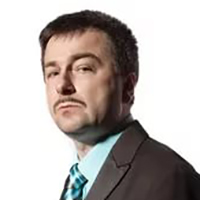Best Educational Programs: INFOCOMMUNICATION TECHNOLOGIES AND COMMUNICATION SYSTEMS
IMMANUEL KANT BALTIC FEDERAL UNIVERSITY
Institute of Physics and Technology
Bachelor’s programme
Master’s programme

SHPILEVOY, Andrey Alekseevich
Director
Programme presentation. Institute of Physics and Technology is a specialized institute of
The major principles of the Institute’s operation are: close connections of fundamental and practical training, balanced combination of advanced theoretical training and students’ research; investigative nature of the majority of graduation qualifying papers; interaction with the region’s leading enterprises.
The training is offered within applied Bachelor’s programme in Multichannel Telecommunication Systems and three Master’s programmes. The specific character of training, the competencies being formed depend upon the requirements of the region in the specialists in the field of info-communication technologies and communication systems.
Antennae and Microwave Devices Master’s programmeis aimed at the region and country’s demands to provide, defence and law enforcement agencies, the centre for space communication and outer locators with radio channel communication, including mobile communication. The Technology of Design and Production of Electronic Systems in the Field of Telecommunications Programme is aimed at the demand of producers and developers of electronic radio equipment for qualified staff capable of developing, designing and production of electronics using advanced microelectronic technologies. Currently, in Kaliningrad Region the number of electronic technological enterprises working for the Russian market has significantly increased.
The Fiber-optical Systems and Information Processing and Transfer Networks Programme is aimed at training specialists capable of working in the field of designing, construction, maintenance, service of fiber-optical lines used in the latest telecommunication systems. Master’s programme graduates are ready to perform research and design work in fiber-optical communication lines.
The material and technical resources of the University is equipped with training and research facilities located in thirty laboratories including Satellite Communication and Navigation Laboratory, Antennae-feeder Devices Laboratory, Laboratory of Quant Methods of Obtaining and Processing Information, Electric Circuits, Circuitry and Radio Transmitters Laboratory, Electrical Link, Semiconductor Electronics and specialised Workshop Laboratory, Information Security and Protection Laboratory, etc.
The educational programmes have been recognized by the professional community and awarded the European Quality Diploma of Research and Production Chamber (2012).The programme is listed in the Best Educational Programmes of Innovation Russia Project. The major has been accredited and by the National Centre for Public Accreditation (Certificate No. 1341-08-A004.2).
The academic process takes place in close cooperation with partner universities: Gdańsk University of Technology (
Teaching staff. The programme is taught by the highly-qualified teaching staff, including 20% of Doctors of Sciences, 39% of Associate Professors and Candidates of Sciences. All teachers regularly take further education courses in specialized and research centres.
Professor V.S. Grechshkin’s radiospectroscopy research school and Professor V.A. Pakhotin’s digital signal processing and optimum reception research school carry out activities within the study field.
The teaching staff regularly take part in international conferences; several professors being visiting lecturers in foreign universities.
Competitiveness of students. The admission score of the students enrolled in Bachelor and Master degree programme in this study field is the highest at the institute. In 2013, it was 223 points.
Graduates are the University’s pride. Maxim Afanasyev is the Department Head of JSC “Rostelecom” Kaliningrad Region branch. Anton Toshchakov is the Head of Informatisation Department of Moscow’s Government.
The Institute has an extensive student mobility programme. Students have their internships in such foreign educational centres as:
Annually those the research-inclined and knowledge-focused have been grant-winners of the RF President, RF Government and Kaliningrad Region Government.
Interaction with employers. Establishing resource educational centres including those based at JSC “Rostelecom”, JSC “YantarEnergo” and Fakel Experimental Design Office to implement joint educational programmes is the key activity of the